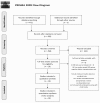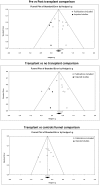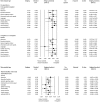Meta-analysis of cognitive functioning in patients following kidney transplantation
- PMID: 28992229
- PMCID: PMC6031036
- DOI: 10.1093/ndt/gfx240
Meta-analysis of cognitive functioning in patients following kidney transplantation
Abstract
Background: There is mixed evidence regarding the nature of cognitive function in patients who have undergone renal transplantation. The aim of this meta-analysis was to examine which cognitive domains are impacted following kidney transplantation and how performance compares with non-transplanted patients or healthy controls/normative data.
Method: A systematic search was conducted using keywords within three databases (Embase, MEDLINE and PsychINFO), yielding 458 unique studies, 10 of which met the inclusion criteria. Neuropsychological tests were grouped into nine cognitive domains and three separate analyses were undertaken within each domain: (i) within subjects pre- versus post-transplant, (ii) transplanted versus non-transplanted patients and (iii) transplanted versus healthy matched controls and standardized normative data.
Results: Transplanted patients showed moderate to large improvements in the domains of general cognitive status (g = 0.526), information and motor speed (g = 0.558), spatial reasoning (g = 0.376), verbal memory (g = 0.759) and visual memory (g = 0.690) when compared with their pre-operative scores. Test scores in the same five domains were significantly better in post-transplanted patients when compared with dialysis-dependant or conservatively managed chronic kidney disease patients. However, post-transplanted patients' performance was significantly low compared with that of healthy controls (and standardized normative data) in the domains of executive functioning (g = -0.283), verbal fluency (g = -0.657) and language (g = -0.573).
Conclusions: Two key issues arise from this review. First, domain-specific cognitive improvement occurs in patients after successful transplantation. Nevertheless, transplanted patients still performed significantly below healthy controls in some domains. Second, there are important shortcomings in existing studies; the length of follow-up is typically short and only limited neuropsychological test batteries are employed. These factors are important in order to support the recovery of cognitive function among patients following renal transplant.
Figures



References
-
- Ligtenberg G. Regulation of blood pressure in chronic renal failure: determinants of hypertension and dialysis-related hypotension. Neth J Med 1999; 55: 13–18 - PubMed
-
- Pyram R, Kansara A, Banerji MA. et al. Chronic kidney disease and diabetes. Maturitas 2012; 71: 94–103 - PubMed
-
- Satko SG, Freedman BI, Moossavi S.. Genetic factors in end-stage renal disease. Kidney Int 2005; 67(Suppl 94): S46–S49 - PubMed
-
- National Institute for Health and Care Excellence. Chronic kidney disease: early identification and management of chronic kidney disease in adults in primary and secondary care. http://www.nice.org.uk/guidance/CG182. - PubMed
Publication types
MeSH terms
LinkOut - more resources
Full Text Sources
Other Literature Sources
Medical
Miscellaneous

